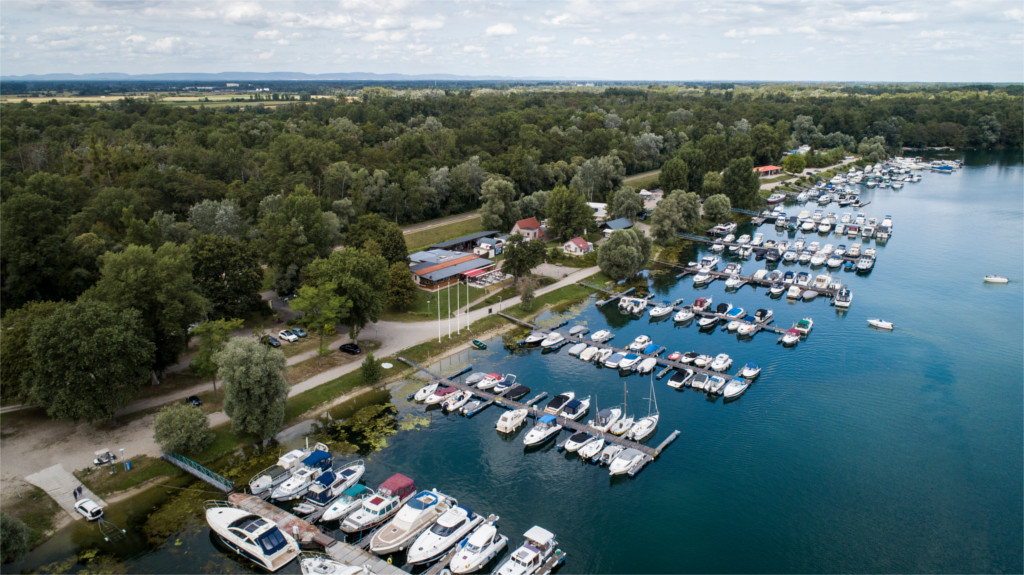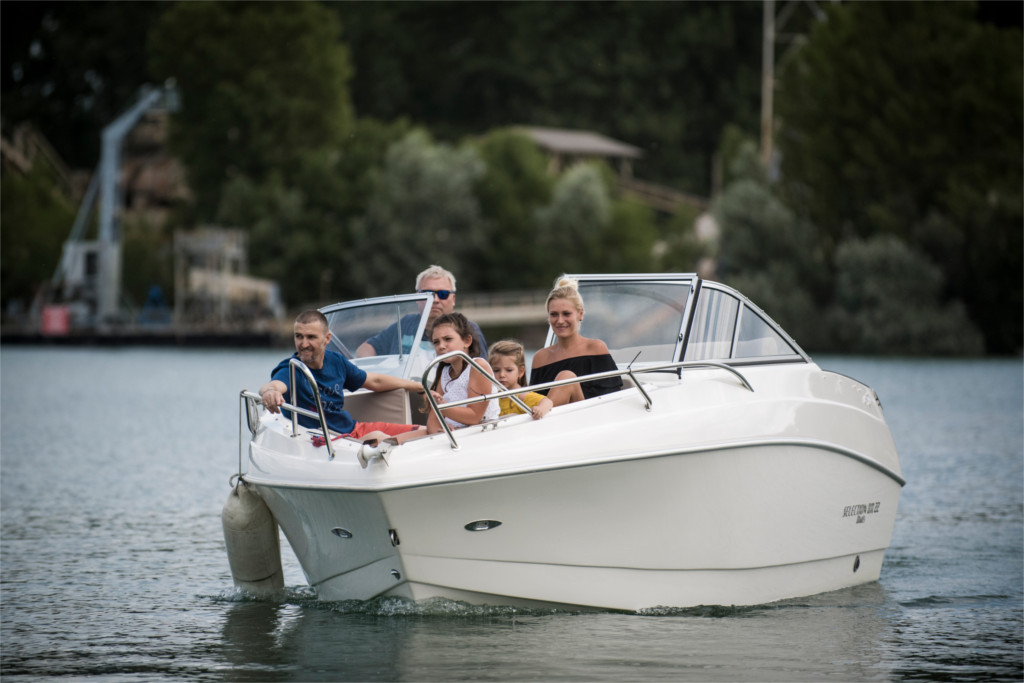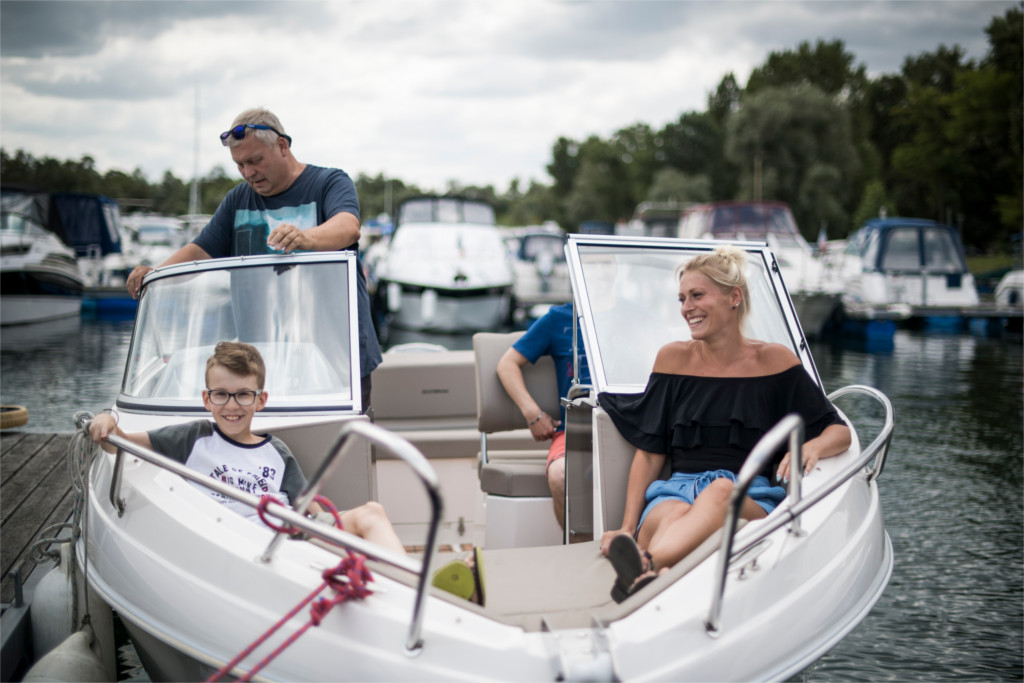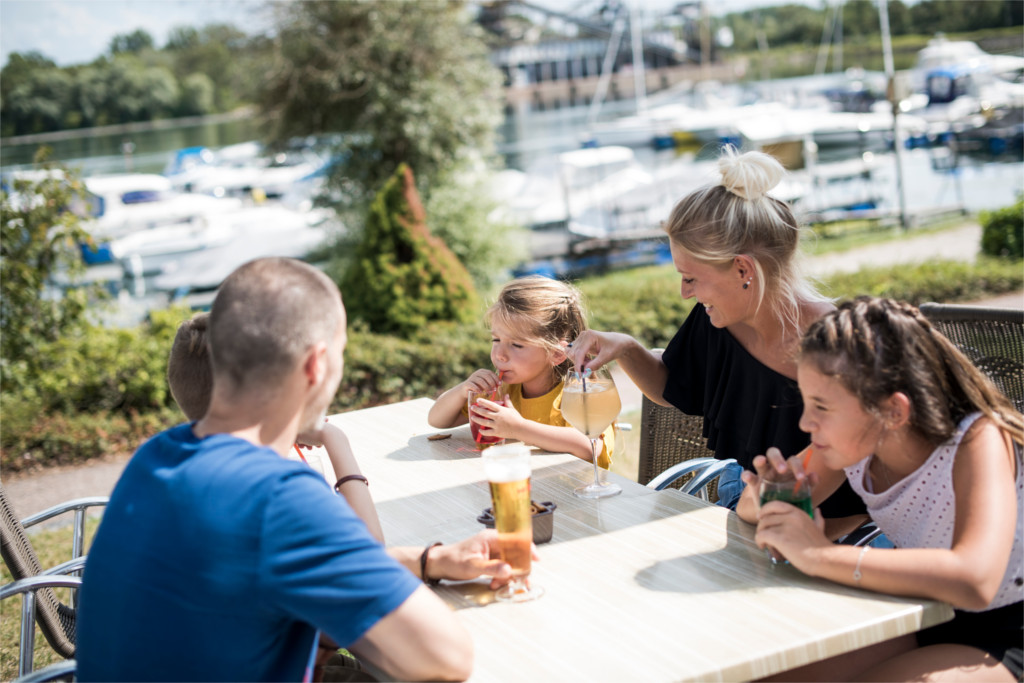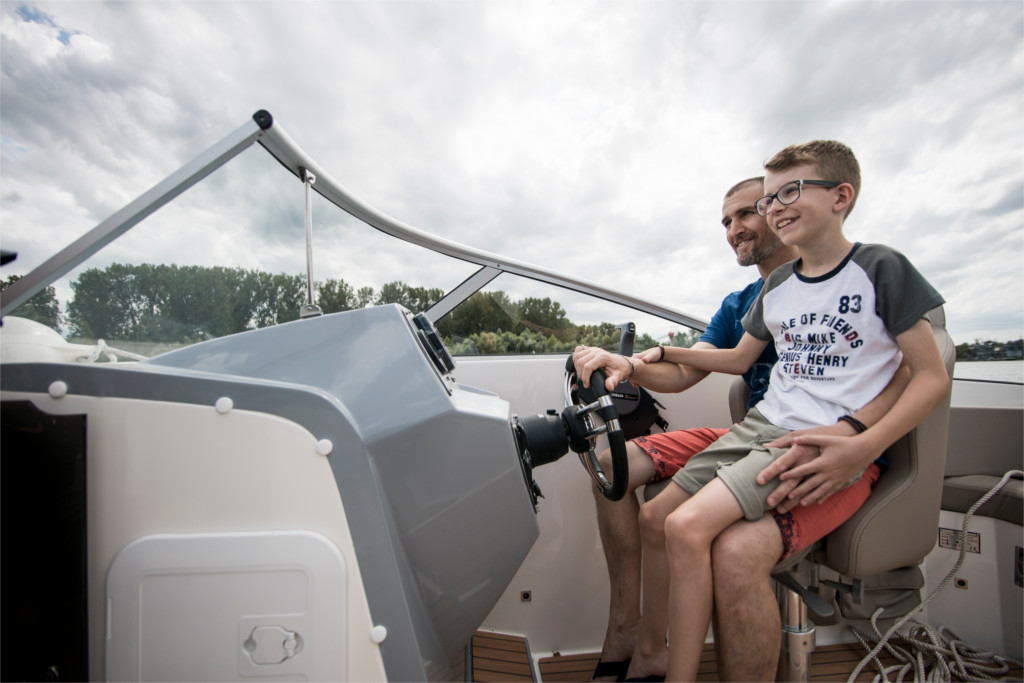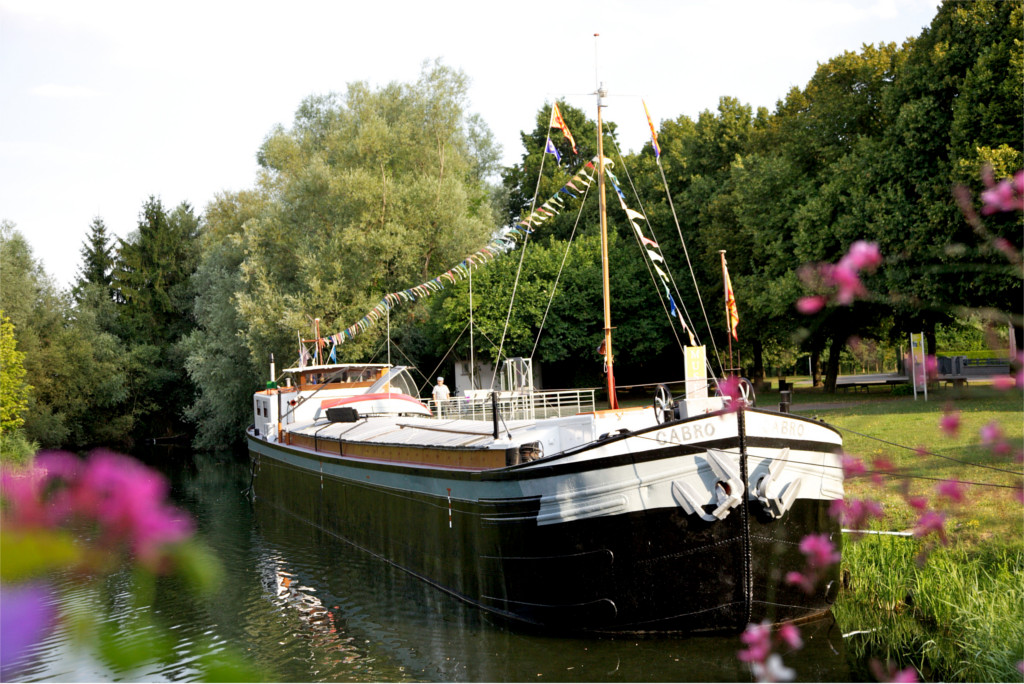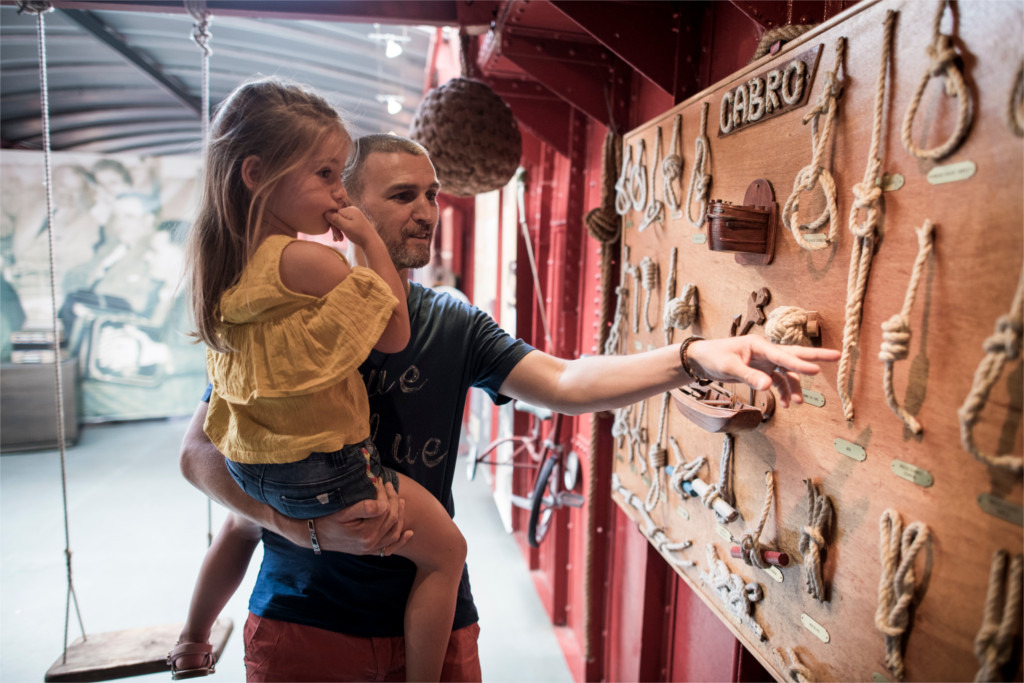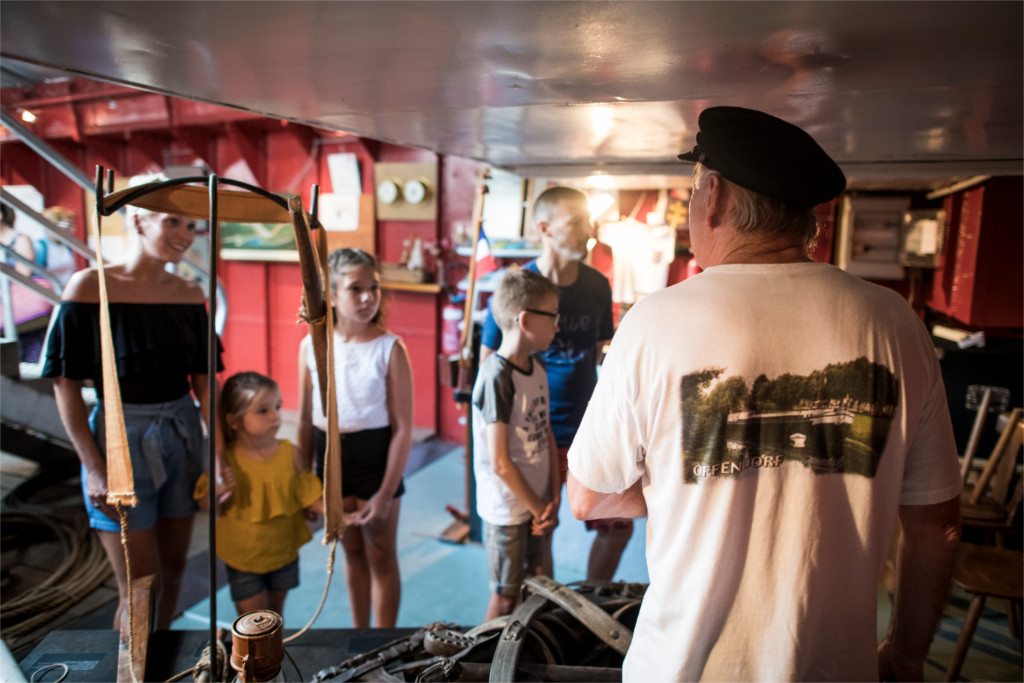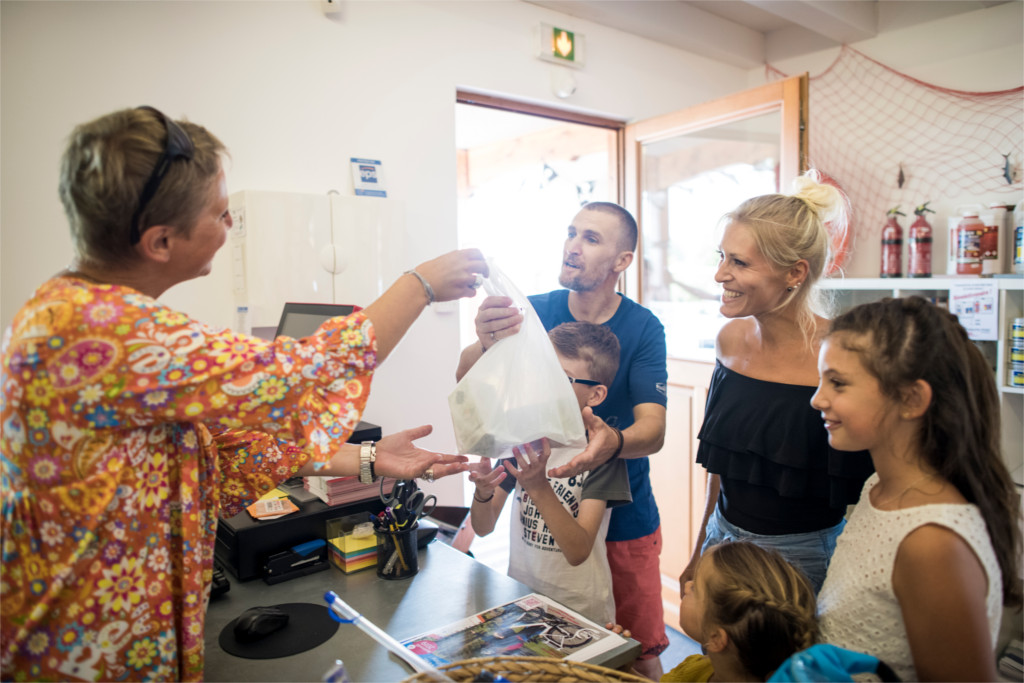OFFENDORF MARINA
It looks like Saint-Tropez, but the largest marina on the Upper Rhine is in Alsace. Try out this little piece of paradise and rent a boat to explore the many aspects of the Rhine.
A STOP ALONG THE RHINE
Escape to a place of peace and relaxation:
a mere 30 minutes from Strasbourg, there are
four water sports centres
for an unusual adventure in Alsace. Nestled in the Rhine forest between the high-water dyke and the Rhine, this 40-hectare body of water is yours to discover.
600 places allow boaters to make a stop in Offendorf for the length of time they want.
Fancy a cool drink and an activity out of the ordinary? The Offendorf marina is the right place for you! You could take a short walk along the pontoons and enjoy a relaxing break on the terrace of the port, from where you can admire the splendid moored boats.
The port can be reached directly from the Rhine, downstream from the Gambsheim lock, or by the dyke road and then the port road from the exit of the village of Offendorf.
FOUR WATER SPORTS CENTRES
- Offendorf water sports centre (BNO)
2 route du Port, 67850 OFFENDORF
Tél. +33(0)3 88 96 74 58
- Nautic Port
4 route du Port, 67850 OFFENDORF
Tél. +33(0)3 88 96 43 79
plaisance@nautic-port.fr
Facebook
- Marina 313 Port ô Rhin
6 route du Port, 67850 OFFENDORF
Tél. +33 (0)6 07 62 76 79
+49(0)78 53 82 92
+49 (0)170 27 39 593
- Marina Park Offendorf (les Dauphins)
8 route du Port, 67850 OFFENDORF
Tél. +49(0)163 277 47 00
Facebook
Each centre offers various services and amenities: control, toilet blocks, sheds, repairs, equipment and boating accessories from major brands.
You could also have a meal in the restaurant overlooking the port, which is particularly pleasant on summer evenings, or do some shopping in the shop, which carries regional products from Alsace and exclusive foodstuffs.
ON THE RIVER
Whatever you are looking for - peacefulness or thrills - you could book a skipper for a trip on the Rhine! If you want your outing to be relaxing and gentle, opt for renting a boat with an electric motor (no licence required) and discover the secret corners of the Rhine. Let time be suspended, the silence only disturbed by birdsong.
A STONE'S THROW FROM THE NATIONAL NATURE RESERVE
In a few seconds, you find yourself in an extremely tranquil natural wilderness. A heron passes overhead, then you see a black kite landing on top of a tree and finally your gaze is caught by water birds, like the common pochard.
You go along the dyke that runs around the four centres and marvel at the luxuriant jungle-like nature typical of the environs of the Rhine.
Just on the other side of the dyke, in a 450-hectare public forest, the National Nature Reserve of 60 hectares lies on a former Rhine gravel bar. This alluvial forest reclaimed its relationship with the Rhine in the early 2000s.
The area is a Natura 2000 zone and is managed by the Conservatoire des Sites Alsaciens which regularly offers nature camps and guided tours led by the national guards.
OFFENDORF, THE HOME OF BARGEMEN
Only five minutes away from the port, the charming village of Offendorf preserves the memory of its river navigation tradition.
A real curiosity, a barge is moored in the middle of the village at the Quai des Bateliers. It did not come on the river, given its size, but by road.
MUSEUM OF INLAND NAVIGATION
As the largest village of bargemen in Eastern France, the town has its own museum, in a barge installed at its centre. It was created by the municipality and the Circle of former bargemen. It tells visitors of the history and traditions associated with canal navigation. This museum barge contains a large collection of objects, documents and models retracing the history, techniques and way of life of bargemen.
MUSEUM OF INLAND NAVIGATION
Opening:
1 May to 30 September on Saturdays, Sundays and holidays from 2 pm to 7 pm.
Address of museum:
15 Quai des Bateliers
F-67850 Offendorf
Contact:
CERCLE AMICAL DES BATELIERS REUNIS D’OFFENDORF(CABRO)
12 route du Rhin
F-67850 Offendorf
Tel: +33 (0)3 88 96 75 14
Email:raymond.friedmann@orange.fr
Youtube
Events not to be missed:
- Bargemen’s Fair in August
- Ferrymen’s Christmas Market at the beginning of December
INTERVIEW
RIVER TRANSPORT: TALES FROM LOCAL PEOPLE
Set sail for Offendorf with the Tourist Information Office of the land along the Rhine! A land of choice for boatmen, fishermen, gold diggers and other proud Rhine trades that only a few diehards perpetuate today.
Throughout the 20th century, life in Offendorf was paced by the comings and goings of bargemen's families. Their activity reached its peak in 1960. At the time, it was the occupation of a third of the population of the town, which had become the largest bargemen's village in eastern France. Today, at a time when road and rail transport have defeated inland waterways, the activity continues to play an important part in the life of this village. We met Denis Hommel, Mayor of Offendorf, and Raymond Friedmann, former bargeman. They gave us their valuable testimonies and many memories.
Could you please tell us more about the inland waterways museum?
D.H.: Our museum barge is a BEAUTIFUL TRUE STORY! It is a historical and ethnographic museum. It emphasizes techniques, the economy, family life, the festive side and all the customs and habits that have been created gradually with beliefs, and which are a mixture of traditions found in many other ports. What brings life to this museum is that the former bargemen, who are also the guides, are part of the museum itself, which is a very important element here that we are very proud of.
R.F: That's right, we're museum pieces. We love to share anecdotes with visitors, or groups who come. What is important to us is to make our profession better known.
What made you set up a museum of inland navigation in Offendorf?
D.H.: So why Offendorf? Because inland waterway transport became extremely important in the course of the 20th century. And why create a museum barge? Because essentially at that time, there was a population of bargemen who had been through the crisis of the second half of the 20th century. They had lost their barges, which had been scrapped because the fleet had to be reduced and canals were no longer fashionable, and so they returned to Offendorf in droves. Many of them were young retirees, the third generation of bargemen, who were born on the barges so to speak. For them, there was no social trauma, because they all found work, as they all had good qualifications and the time was right for them. But it was a human tragedy because their lives had completely changed. And I wanted to capture that living memory and create this museum. It took us almost more than 10 years, from 1989 to 2000, to set up the museum. It was part of a long effort that was carried out with historians and especially ethnographers.
There was a time when Offendorf was the largest bargemen's village in eastern France. Could you tell us about it?
D.H.: In Offendorf, inland navigation produced some very characteristic consequences. For example, in the school, 10 out of the 30 pupils in a class were children of bargemen. I remember when I was a child, I always sat next to a bargeman’s boy because he had extraordinary stories to tell! During the first couple of days in school, my neighbour talked continuously about his travels during the summer, while I had never left home... Landlubbers like myself used to go for walks along the Rhine, or small car trips with our parents. People did not go away on holiday at the time. But bargemen’s families had seen the Seine in Paris, and the great cinemas they went to when they stopped in the port of Paris. It was extraordinary, a picture book...
R.F.: There were yet other traditions, which still exist today. For example, inland navigation items were placed in gardens. Masts, poppets, anchors and awnings. So if you walk through the streets of Offendorf, don't be surprised if you find propellers and other such things in the gardens!
D.H.: In the collective memory in Offendorf, there are also the comings and goings of the bargemen, who returned at specific times of the year. For example, they would all come home for All Saints' Day. They were many of them, and it was a big festival at the time! They would also come back for Christmas and the New Year.
R.F.: And also for the messti (village fair), which was a major event! It started on Friday and ended very often on Monday. Everyone had a memorable weekend!
D.H.: But it also had a sadder side, because that was when the bargemen would drop off their children. Children, or rather their schooling, was a major problem for the family life of a bargeman!
R.F.: We always had them with us from birth up to the age of six and a half. After that, we had to leave them to relations, uncles, aunts, grandparents or in a boarding school. It was always heartbreaking...
How many active bargemen do you still have in Offendorf?
R.F.: Today there are still five left!
Mr. Friedmann, you also were a bargeman. Can you tell us a little bit about your job?
R.F.: A bargeman’s job is like that of a lorry driver. We used to carry goods, only on the inland waterways (rivers etc.) with a barge and not a truck. Bargemen are basically self-employed. Some work for barge companies, but most are independent workers.
Now that you're retired, you must have had to get used to living on land. Have you kept any of your bargeman’s habits?
R.F.: I always say that we are like Obelix. Obelix fell into the magic potion when he was little and we fell into the water! We continue to be different, because our lives as bargemen have been so unlike those of others! When we leave Offendorf for Strasbourg we “go up to Strasbourg”. The others, who rely on compass directions, “go down” to Strasbourg, since it is to the south of Offendorf. When we cross a bridge, we always stop in the middle and look at the water and what is going on there, nothing else interests us. And we do all this without even noticing we are doing it!
D.H.: Former boatmen go at least three times a week to the Rhine and sit there for a while... Sometimes I am told that they stay there for hours on end, by the Rhine, but their minds are in Amsterdam, Rotterdam or Paris!
Mr. Friedmann, you and your wife have spent almost all your life on board your boat the LU-NI. Do you have any regrets?
R.F.: Quite the contrary. Indeed, it can be difficult sometimes, it’s not like it’s a continuous holiday. But the scenery changes every day.
We never fell asleep in the same place, and had a different view every night! And even though we often passed by the same place, it was never the same! The scenery changed with the people, the seasons, the light... There were some habits that I liked, which I had to give up. For example, if we met up with another boat and there was a football game on the television that night, we would stop, drop anchor, stay together, watch the match together, drink a bottle of beer, and at 11 o'clock in the evening we would head on to our destination.
Your last word?
D.H.: Are you interested in our history and life on a boat? Then join us in "The Saga of the Offendorf Bargemen". A picturesque story of a family of bargemen from Alsace who spent their whole lives on the canals and rivers of Europe, transporting bulk goods, coal, potash or foodstuffs. These memories cover over a century of shipping on the Rhine, the Moselle and the Meuse.
R.F.: The Bargemen of Offendorf, who have always loved the waterways, are now more determined than ever to revive the art of inland waterway transport and to introduce as many people as possible to the history of the Offendorf Bargemen. The Inland Waterway Museum is open every Saturday, Sunday and public holiday from May to September and all year round by appointment.
Find your way out
